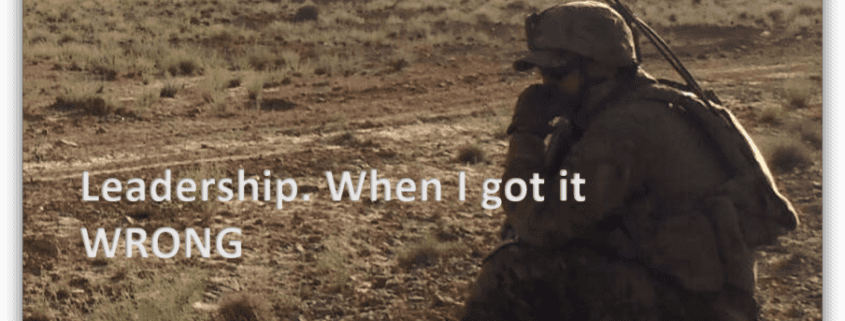We hear a lot of positive stories, and the ‘how to’ of successful leadership scenarios. This is not one of those. Let me tell you about the time when I got it completely wrong.
I thought as a junior officer I knew the intricacies of leadership and command. I didn’t know at the time how much I had left to learn, and still do to this day. Specific to this incident, was my lack of E.Q. understanding of stressor impacts, and conflict resolution skills.
Do not mistake my lack of experience for a lack of willingness to do good. I cared about my team, their families, their prospects and life goals but, the in-depth knowledge of how they all interconnected to either support or undermine the team was limited. Retrospectively, I believe that in this instance, I subscribed too heavily towards a ‘mission’ first mentality, at the expense of the team.
The Scenario.
For the purposes of this article let’s call the other person Bill.
On return from an Army exercise, a piece of very important equipment couldn’t be located. It was Bill’s responsibility. He was in a position of leadership at the time, and not being able to find it meant that my team was still working, when the rest of the unit had been home for hours. A terrible outcome for the soldiers and their families desperately craving to be reunited.
In this instance, I was unaware of the life stressors occurring in Bill’s life. Bill was always so cool, calm and collected at every turn that, it never occurred to me that his life was literally burning down around him. I had known Bill prior to us working together and he had a reputation for being a strong, fit, competent and professional man. However, I was focused on preparing the team for operations, fixing the overt issues and working on ensuring the team was at a ‘high performance’ level. I was thinking about the group as a whole and did not make the crucial connection of the group being made up of individuals.
Once the item was found, in his kit, I was livid. I counselled the person in a fashion completely contrary to my character. There are no excuses. Stress from a pending deployment, embarrassment from the counselling I received from my commander or even the disappointment that my team had missed out on even more time with their families, were no reasons for my behaviour.
My counselling of Bill was aggressively vocal. It was completely uncharacteristic of me and shameful. An interaction that wasn’t lost on my team. Bill also did not take it very well and it had a lasting impact on him. It took time to gain the trust of my team back.
Lesson 1 – Provide clear vision and intent, the mission will happen.
If I had looked after Bill, provided a clear vision and intent, I would have enabled him to a way to tell me what was going on outside of work. Then, I could have worked with him to fix it and ultimately, set the conditions for him to succeed. Instead, I undermined his faith in me as a leader.
Lesson 2 – Stick to your values.
My response at the time did not align with my values (accountability and service). Where was my service to this man and how was I being accountable to him? It was my job to protect him and ensure that his faith in me as a leader was paramount.
Lesson 3 – Find space between the stimulus and the reaction. (Bram Connelly in his Warrior U podcast, Episode 01: KC Finnegan – USSF Major, he explains this well.
When the incident occurred, I should have taken the time to analyse and decipher the variables and considerations. The equipment had been found, that was a positive. While the team was the only one left, they were together and all unified in their search. This was uncharacteristic of him, what is wrong? If I had taken the time to absorb all the variables, I may have found out something that could have prevented a greater impact on Bill later.
Lesson 4 – Make the best decision you can with the information you have.
At the time, with the information I had, this was not the best decision I could make. I knew this man extremely well and I knew it was out of character. Instead of confirming information, I sought to transfer anxiety from my Commander to him.
Lesson 5 – Know your people, they are not their behaviours.
I didn’t find out until later that the interaction had a long term and devastating impact on him. It impacted his Afghan deployment and contributed to some long-term issues. To his credit, he reached out. He explained how the incident had impacted him and it was something that he had never really let go. I had no idea that the interaction had hurt him. It hadn’t registered to me as something that would have.
Lesson 6 – If you are wrong in your approach, own it, TRY TO MAKE IT RIGHT!!
After he told me the impact the event had on him, I was gutted. So, I did the only thing I could and owned my mistake. There was an explanation of my thought process at the time and how with the benefit of hindsight and experience, I would have done things differently. Now, I am doing what I can to make it right. I keep in contact with him regularly and it is a constant reminder to stick to my values.
Dave and I have unpacked this a hundred times so that we can learn from it and never make these mistakes again. So, feel free to take a free one from my error. We use our experiences and lessons like these at The Eighth Mile Consulting because it keeps us accountable to ourselves and the good people we work with.
Dont be a jerk and never underestimate the impact your actions have on other people.

 The Eighth Mile Consulting
The Eighth Mile Consulting
 The Eighth Mile Consulting
The Eighth Mile Consulting  The Eighth Mile Consulting
The Eighth Mile Consulting 
 The Eighth Mile Consulting
The Eighth Mile Consulting  The Eighth Mile Consulting
The Eighth Mile Consulting 
Trackbacks & Pingbacks
[…] of who is “right,” it is your responsibility as a leader to fix the […]
Leave a Reply
Want to join the discussion?Feel free to contribute!